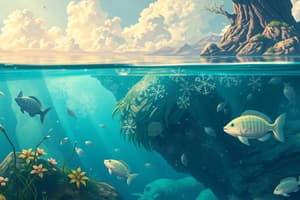Podcast
Questions and Answers
Match the following uses of water with their corresponding activities:
Match the following uses of water with their corresponding activities:
Supplying drinking water = Recreation Irrigating crops and watering stock = Industrial processes Navigation and shipping = Production of edible fish, shellfish and crustaceans Protection of aquatic ecosystems = Scientific study and education
Match the consequences of degraded water quality with their impacts:
Match the consequences of degraded water quality with their impacts:
Loss of ecosystem habitats = Loss of commercial value diminished recreational value = Decreased agricultural productivity Increased human health risks = Environmental degradation Reduced economic value = Decreased social value
Match the characteristics of water quality with their definitions:
Match the characteristics of water quality with their definitions:
Physical = Appearance and smell Chemical = Properties of water Biological = Presence of organisms Aesthetic = Supports public health
Match the factors affecting water quality with their descriptions:
Match the factors affecting water quality with their descriptions:
Match the importance of water quality with their corresponding reasons:
Match the importance of water quality with their corresponding reasons:
Match the consequences of polluted water with their effects on human health:
Match the consequences of polluted water with their effects on human health:
Match the following indicators with their respective aspects of water quality management:
Match the following indicators with their respective aspects of water quality management:
Match the following ecosystems with their dependence on water quality:
Match the following ecosystems with their dependence on water quality:
Match the following human uses with their requirement for water quality:
Match the following human uses with their requirement for water quality:
Match the following goals with their relation to water quality management:
Match the following goals with their relation to water quality management:
Match the following water environments with their respective aspects of water quality:
Match the following water environments with their respective aspects of water quality:
Match the following water quality aspects with their impact on human health:
Match the following water quality aspects with their impact on human health:
Match the following statements with the correct reasons for protecting aquatic ecosystems:
Match the following statements with the correct reasons for protecting aquatic ecosystems:
Match the following statements with the correct impact of water quality on human health:
Match the following statements with the correct impact of water quality on human health:
Match the following statements with the correct aspect of water conservation:
Match the following statements with the correct aspect of water conservation:
Match the following statements with the correct reason for maintaining water quality:
Match the following statements with the correct reason for maintaining water quality:
Match the following statements with the correct aspect of ecosystem health:
Match the following statements with the correct aspect of ecosystem health:
Match the following statements with the correct agricultural impact of water quality:
Match the following statements with the correct agricultural impact of water quality:
Study Notes
Water Quality Overview
- Defined by physical, chemical, biological, and aesthetic characteristics (appearance and smell).
- Essential for sustaining diverse communities of organisms and protecting public health.
Importance of Water Quality
- Impacts community water use: drinking, swimming, commercial activities.
- Crucial for:
- Supplying drinking water
- Recreational activities (swimming, boating)
- Irrigating crops and livestock
- Industrial processes
- Navigation and shipping
- Aquatic food production (fish, shellfish)
- Protecting aquatic ecosystems and wildlife habitats
- Scientific research and education
Consequences of Poor Water Quality
- Degraded water resources lead to loss of environmental, social, and economic value.
- Threatens public health, ecosystem habitats, agriculture, fishing, and tourism.
Factors Affecting Water Quality
- Tightly linked to surrounding environmental conditions and land use.
- Monitoring focused on local contaminants due to high assessment costs.
- Data aids in developing management programs to protect water quality.
Water Quality and Aquatic Ecosystems
- Aquatic ecosystems include diverse organisms interacting with their environment.
- Maintaining these ecosystems is essential for:
- Supporting human populations and environmental health.
- Fostering genetic diversity and ecosystem stability.
- Indicating overall water quality and suitability for various uses.
- Providing significant protein sources for humans and supporting commercial/sport fishing.
Water Quality Management
- Key tools for managers include monitoring and protecting public health, economic support, and ecosystem maintenance.
- Vital for river health, impacting native fish, vegetation, wetlands, and birdlife.
- Necessary for diverse human activities: irrigation, livestock, recreation, and cultural needs.
Water Quality Objectives
- Established through community consultation to protect environmental values and water uses.
- Includes recreational use, healthy aquatic ecosystems, and safe drinking water.
- Implemented for both surface waters and marine environments.
Definition of Water Quality
- Essential to human life and environmental health, covering various types: marine, estuarine, freshwater, and groundwater.
- Interdependent dimensions: quantity and quality.
Studying That Suits You
Use AI to generate personalized quizzes and flashcards to suit your learning preferences.
Description
This quiz assesses your understanding of how water quality affects aquatic ecosystems, including the importance of monitoring and management programs to protect the environment and ensure water quality. Learn about the impact of contaminants on local ecosystems and how to develop effective action plans. Test your knowledge of the intricate relationships between water quality and aquatic life.




